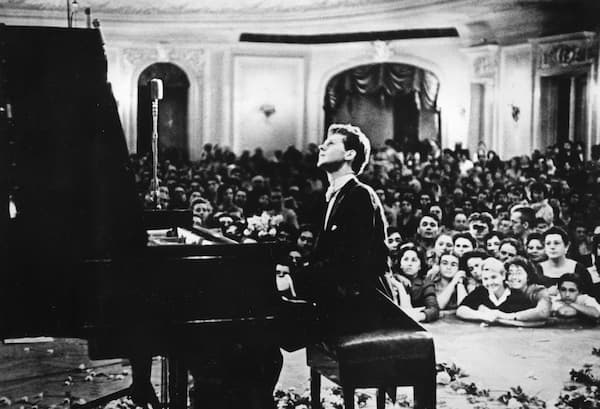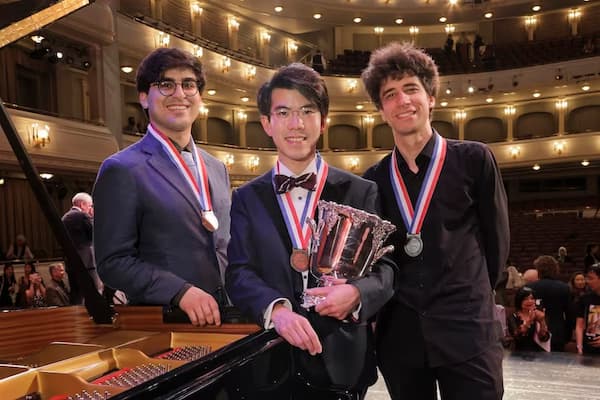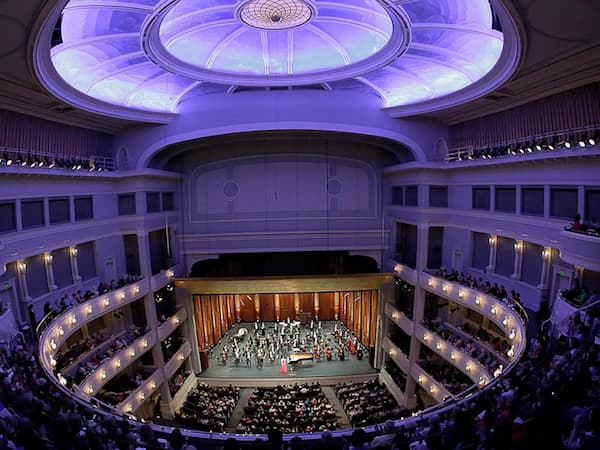After 2 weeks into the Queen Elisabeth Competition in Brussels, Belgium, one of the oldest and most prestigious competitions in classical music, another exciting competition – the Van Cliburn Piano Competition – began in full swing across the pond in Fort Worth, Texas, U.S.A.. The 2 competitions’ overlapping schedules (May 5th to June 11th; May 21st to June 7th, respectively) resulted in an utterly busy but fascinating month for classical music fans everywhere, accessing both events simultaneously, streaming at any time, day and night.

Van Cliburn’s Legacy © The Cliburn
The Van Cliburn Competition had its beginnings in 1962 (now in its 17th edition) when an American pianist from Texas, Van Cliburn, achieved worldwide recognition by winning the inaugural Tchaikovsky Competition in 1958. By that glorified achievement, he made history as the first American to win an international music competition held in Russia, notable because it occurred during the Cold War. Since then, the Van Cliburn Competition continued its operation every 4 years till the present day, drawing uncontested attention from millions of music advocates, congregating enthusiastically on location or online in support of its remarkable events, presentations and festivities.
In 2013, I had the privilege of attending this competition in person for 3 weeks. My impression was that “The Cliburn” had already distinguished itself among other high-profile competitions, namely the Chopin, Tchaikovsky, Leeds and Queen Elisabeth Competitions, in its display of fanfare, glamour, and flashiness. The organising committees boasted extravagant parties and daily cocktail receptions, entertained participants and audiences with the warmest hospitality, and generously made available Steinway grand pianos to all the host families for candidates to practise on. In 2025, there were 28 candidates selected out of 340 applicants from 45 countries, to compete in the preliminaries in Fort Worth. That number was reduced to 18 in the quarterfinals, subsequently to 12 in the semifinals, ending with 6 finalists from which 3 were chosen as top prize winners. To keep the public “in the loop”, commentaries and interviews were featured, competitors were introduced via comprehensive stories, and merchandise was conscientiously marketed. The overall ambiance seemed to appear closer to a Hollywood-inspired festival than a traditional classical music event.

2025 Competition Winners – Gold:Aristo Sham (29)/ Hong Kong, China; Silver:Vitaly Starikov (30)/ Israel&Russia;
Bronze:Evren Ozel (26)/ U.S.A. © The Cliburn
Moreso, I would be remiss if I did not mention the munificent financial awards allotted to those who excelled. Monetary prizes totalled US$ $2 million, covering management, marketing and publicity expenses, plus 3 years of international concert tours with travel and clothing allowances for the winner, therefore tempting the best and the brightest to join the race.
However, their program requirements are among the most gruelling in comparison to other competitions. It entails 4 rounds of concerts in less than 3 weeks, starting with 2 recitals ( preliminary and quarterfinals ) comprising own choice programs of 40 minutes each, with a compulsory contemporary work included. The semifinals, which also consist of an own choice program, allowed 60 minutes for the solo recital, combining with a Mozart Concerto from a specified list. The finals require 2 full concerti, one to be selected from an appointed list and another of their own choice with no time restrictions. I wonder if the purpose of such an overload ( 3 recitals and 3 concerti – close to 5 hours of repertoire preparation ) is to test candidates’ physical and emotional resilience to pressure, in anticipation of stressful careers ahead.

Bass Performance Hall – Fort Worth, Texas, U.S.A. © medici.tv
Such advanced level competitions usually attract the “crème de la crème”, who belong to the uppermost echelons of the elite musical world. Nonetheless, their fate is still precarious – inevitably dependent on the jurors’ spur-of-the-moment judgments, behind-the-door negotiations and strategic compromises. It is not surprising that controversial viewpoints clash, conflicts of interest erupt, and serious power plays escalate, causing disagreements to disrupt adjudication procedures. Under such circumstances, if there emerges a seasoned candidate who checks all the right boxes, i.e., manifests balanced capabilities, excels in superbly challenging repertoire, demonstrates professionalism, avoids interpretative risks, and more importantly, maintains a predictable comfort zone for audiences to enjoy music without anxiety, shouldn’t he or she be voted a winner?
What if this candidate also has an amazing pedigree – stellar reputation from early childhood as an exceptional prodigy, excellent education from renowned schools in HK and the UK, prestigious musical training in top notch conservatories like New England Conservatory and Juilliard School, academic exposure in an Ivy League university like Harvard, rich concertising experience with countless accolades, and stamina to master brutal piano repertoires with ample technique to spare, e.g., Beethoven‘s “Hammerclavier” Sonata and Brahms‘ Piano Concerto no.2? This superstar could easily “wow” the masses!

2025 Competition Finalists – from left to right :- Angel Stanislav Wang (22)/ U.S.A., Phillip Lynov (26)/ Russia, Evren Ozel (26)/
U.S.A., Carter Johnson (28)/ Canada & U.S.A., Aristo Sham (29)/ Hong Kong, China, Vitaly Starikov (30)/ Israel&Russia © The Cliburn
Supposing this individual on hand is Aristo Sham, and he not only fulfills all the criteria mentioned above, he is additionally well-versed in the academics, savvy in manners, articulate in interviews, always presentable in dapper attire, my prediction that he attains the title of “The Face of The Cliburn” will definitely actualise.
Mendelssohn: Piano Concerto no.1 in G minor, op. 25
In reference to my prior reviews on recitals, I had mentioned 2 completely diverse benchmarks in assessing performers:
1. The first scenario is about the performer who regularly entices listeners to love his music regardless, even if the repertoire may not be to their liking. This unique attribute must have emanated from his lifelong passion for music, and the convincing outcome duly stemmed from his genuine and profound artistry.
2. The other scenario is a celebrated performer who is ultra popular ( especially among the populace ), that he not only charges high ticket prices for his uninspiring concerts, but succeeds in prompting the crowd to pay fat fees for autographs and photo opportunities in the lobby afterwards.
After closely watching all 28 candidates, I concluded that the following pianists are indeed akin to the first breed of musicians in the paragraph as cited above. Some may not be naturally charismatic, but they are more than capable of touching their audiences with music deeply meaningful and substantial, which in turn radiates glimmers of humanity.
1. These 3 are finalists who did not make it to the exclusive winners’ circle. Given a different jury, they could have won the top 3 prizes:
Carter Johnson – the most mature artist in this competition; genuine expressiveness; warm sounds; very professional in all his performances.
Maurice Ravel: Piano Concerto for the Left Hand in D major
Phillip Lynov – powerful and commanding personality; assertive and honest interpretations; hungry for his music to be heard.
Franz Liszt: Piano Concerto No.2 in A major
Angel Stanislav Wang – full of youthful vigour; strong emotions palpable in his music; tremendous potential for future as a concert pianist.
Sergei Rachmaninoff: Piano Concerto No.3 in D minor, op.30
2. The next group represents pianists who did not qualify for the quarterfinals or semifinals, but who made indelible impressions on me:
Magdalene Ho – intuitive and creative personality; always ventures “out-of-the-box” in her musical realm; innovative and unconventional interpretations.
J.S.Bach: Toccata in D major, BWV 912
Yanrui Cai – intense and passionate; imaginative programming; serious approach to his music.
Alexander Scriabin: Fantasy in B minor, op. 28
Poitr Alexwicz – delicate and thoughtful touch; authentic Polish sentimentality; natural finesse.
Ottorino Respighi: Six Pieces for Piano
David Khrikuli – able to produce numerous shades of sounds on the piano; subtle and sensitive expressiveness.
Johannes Brahms: Fantasien, Op. 116
Jonas Aumiller – genteel and sophisticated; elegantly stylistic renditions; gifted in composition; composed his own cadenza.
Wolfgang Amadeus Mozart: Piano Concerto No. 27 in B-flat major, K. 595
Nowadays, classical music concerts have morphed into spectacular shows. The fact is that “The Cliburn” has awarded a predictable winner to ensure successful ticket sales, especially in Asia. Feverish media coverage of Aristo Sham has already permeated all of Hong Kong since his victory!
For more of the best in classical music, sign up for our E-Newsletter



